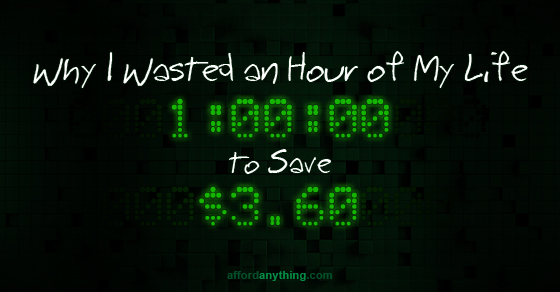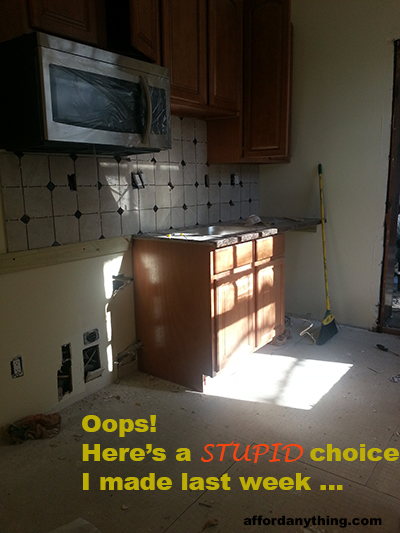I’d like to tell you about a stupid money mistake I made last week.
I’ll share why it was so dumb … and how you can do the opposite.
Let’s go:
During the past three months, I’ve been overseeing the renovations on one of my six rental property units.
We’re ripping everything out of the unit — including the floors, walls, countertops, cabinets, plumbing — and re-imaging the dwelling.
At the end of the project, this apartment will be more space-efficient, more energy-efficient, and gleaming with high-end finishes.
Justifiably, the rent on this apartment will skyrocket 60 percent.
The “rental range” for a one-bedroom apartment in this neighborhood runs from $600 to $1,300 per month, depending on the quality.
Previously, this unit has rented for $700 per month, near the bottom of that range. Post-renovation, we’ll start listing it at $1,125, near the top of the range.
At any rate, managing a renovation – as my longtime readers know – is a ton of work. No matter how much of the manual labor I outsource to the contractors, I still need to make decisions like:
- How can we configure a 70-square-foot kitchen in the most efficient layout?
- Where can we find space to plumb an in-unit washer/dryer?
- Should we rip out this load-bearing wall?
You can outsource the execution, but as the owner, you’re still responsible for making high-level decisions.
And because of this, you must fiercely protect that precious space inside your brain.
Humans have limited mental bandwidth, and – as the owner of your mind – your job is to resist the temptation to get stuck in the weeds. Keep your mental space free, so that you can focus on the decisions that make the biggest splash.
Getting wrapped up in the small picture is a terrible use of your time and talent.
And that leads me to my folly.
You see, I made a mistake when I ordered the kitchen cabinets. (No, that’s not the mistake I’m talking about. We’ll get there soon.)
I accidentally forgot to order one of the cabinets – an oversight which has resulted in a prominent blank space on the kitchen wall. Oops!
No problem, right? I’ll just order another one.
So I called the mom-and-pop discount store where I buy my factory-outlet cabinets (for a price that’s far cheaper than Home Depot or Lowes). I spoke directly with the owner, and asked if I could order one 30×30 Ginger Maple wall cabinet.
“Roman-arch front and concealed hinge,” I specified. These cabinets will match.
The owner quoted a price of $120, and I was about to read my credit card information over the phone when she said these irresistible words:
“We offer a three percent discount if you pay in cash.”
Ding ding ding!! Who can resist a deal?!
“I’ll be right there,” I blurted out. I hung up the phone, grabbed my car keys and some cash, and flung myself out the door.
I was 10 minutes deep into the drive when the “sale” adrenaline wore off and I began to think with a cool head.
“Hold on,” I thought. “I’m driving … 20 minutes there, and 20 minutes back. Plus I’ll spend another 20 minutes in-store. This 3 percent discount is going to cost an hour of my time.”
“And three percent of $120 equals …. $3.60.”
“Holy freakin’ moly, I’m wasting an hour of my life to save $3.60.”
**(Here’s the point where I would have slapped myself on the forehead, if I wasn’t behind-the-wheel.)**
Then, just to add insult to injury, I realized that after paying for gasoline, I’d break-even anyway.
Doh!
My mistake? I made an emotional, knee-jerk decision.
I heard the word “discount” and immediately reacted – without taking a breath and thinking logically through the process. I allowed emotion to block my ability to perform basic math.
In this instance, my consequences were negligible – I only lost one hour of my life.
But how many people make this type of error on a massive scale?
How many times do we let ourselves get so wrapped up in emotion that we make stupid choices with our time and money, because we’re not thinking rationally?
- “You can’t put a price on education!”
- “If I keep earning enough graduate degrees, eventually someone will give me a good job.”
- “Homes are a “good investment,” so I can dump any amount of money into upgrading my place — without conducting a single shred of analysis — and convince myself that it’ll raise the resale value!”
- “Let’s stand in line on Black Friday, in the freezing cold, for 5 hours, so that we can save $50 off a plasma TV. (Because our time is only worth $10 per hour, and because a plasma TV is a basic human necessity, no matter how broke we are.)”
- “When you travel, you can live and work at various places “for free” – in exchange for 8 hours per day of back-breaking unpaid labor. Yay free stuff!!”
Humans are emotional creatures. We’re not always logical — especially when it comes to our careers, homes, investments and income.
That little fact-of-life is a barrier that keeps many people from optimizing their precious time and energy.
So if you want to master your money, quit making knee-jerk reactions.
Learn which words trigger emotional responses, such as:
- Save
- Sale
- Discount
- Clearance
- Free
- Investor
- Returns
- Stocks plummeted
- Recession
- Hot stock
And when you hear one of those trigger words: Pause.
Breathe.
Crunch some basic numbers.
Think with a cool head.
And remember what your time is worth.

